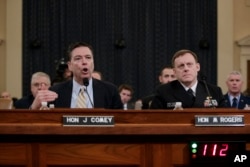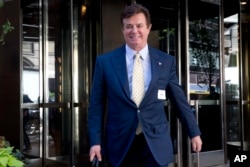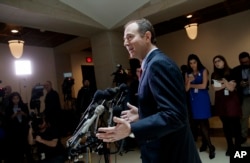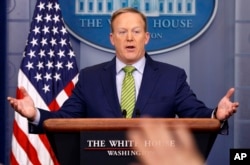Key U.S. lawmakers appear locked into a war of words over halting progress in their investigation into Russian interference in the 2016 presidential election campaign.
The latest skirmish was sparked by the abrupt cancellation Friday of an open hearing set to feature top former intelligence officials. House Intelligence Committee Chairman Devin Nunes, a California Republican, argued that it was instead necessary to hear closed-door testimony from the directors of the FBI and the National Security Agency.
"The committee seeks additional information ... that can only be addressed in closed session," Nunes told reporters during a hastily arranged news conference.
Word of the change ignited criticism from congressional Democrats, who pointed out FBI Director James Comey and NSA Director Admiral Mike Rogers had already testified on Monday.
During that hearing, Comey confirmed for the first time that officials were investigating possible connections between the President Donald Trump's campaign team and Russia.
'A dodge'
"I don't think anyone should have any question about what is really going on here," said Representative Adam Schiff of California, the top-ranking Democrat on the Intelligence Committee. He called the cancellation of the hearing with former Director of National Intelligence James Clapper and former CIA Director John Brennan "a dodge."
He also described Nunes' announcement that former Trump campaign manager Paul Manafort had agreed to speak with the intelligence committee as a ploy aimed at deflecting attention.
"There must have been a very strong pushback from the White House," Schiff said, referring to the initial hearing with the FBI and NSA directors. "It's hard for me to come to any other conclusion about why an agreed upon hearing would be suddenly canceled. ... What other explanation can there be?"
Russia has consistently denied U.S. intelligence community assertions that it tried to influence the outcome of the presidential election.
Trump has also pushed back against the allegations, arguing they have been driven by Democratic Party officials making excuses for why their candidate, Hillary Clinton, lost.
Tensions have been rising all week, first coming to a head Wednesday when Nunes charged the president and some associates had been swept up in "incidental collection" activities and took the evidence directly to the White House.
Briefing reporters following a meeting with Trump, Nunes alleged the president and members of the Trump transition team "were clearly put into intelligence reports," adding "some of it seems to be inappropriate."
'Valuable intelligence'
But Nunes, who himself was a member of Trump's transition team, seemed to back off the charges Friday.
"These reports that I've read are, for the most part, valuable intelligence," Nunes said. "It appears like this was all legal."
Still, Nunes maintained there were pieces of information in the reports "that I don't think belong there," and again questioned whether the identities of the president and some associates might have been unnecessarily unmasked.
"Maybe someone has a good reason for it, but not from what I've been able to read," Nunes said.
Democrats, led by Schiff, have expressed outrage, saying Nunes' conduct has raised "profound concerns" that the goal is to provide cover for Trump's allegations, made on Twitter, that he had been "wiretapped" by former President Barack Obama.
Schiff went one step further, charging that recent developments all pointed back to the current White House.
"In an effort to further justify the unjustifiable, he is now interfering in this investigation," Schiff said. "I think the fact that the chairman's press conference [Wednesday] was at the White House is not only symbolically important, it's important in terms of understanding what's really going on here."
Reports not shared
Democrats and Republicans on the House Intelligence Committee have also voiced concern that Nunes has so far refused to let them see the documents and intelligence reports upon which he has based his allegations.
As a result, there has been growing speculation that the White House may have played a role in getting the documents to Nunes, something Nunes himself has refused to rule out.
White House press secretary Sean Spicer said Friday that it was a question he could not answer.
"I'm not aware of where he got the documents. I don't know," Spicer told reporters during a White House briefing.
Spicer also said the president still felt somewhat vindicated by Nunes' statements, despite the lawmaker's apparent backtracking.
"This discussion, it continues to show there was something there," Spicer said. "There's been an acknowledgment that there are documents out there showing that people were surveilled or monitored."
In his testimony Monday, FBI Director Comey rejected Trump's wiretapping claims outright.
"I have no information that supports those tweets. And we have looked carefully inside the FBI," he said.








